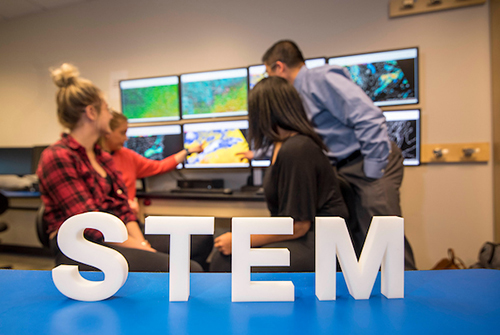July
The science behind lawmaking
Engineering students draft legislative policy for state representatives in inaugural STEM policy fellowship
By Matt Watson
July 18, 2018
 One hundred million dollars, elimination of the gasoline tax and a way to pull drinking water out of thin air.
One hundred million dollars, elimination of the gasoline tax and a way to pull drinking water out of thin air.
Those are all things Roadrunners spent their summers working toward as part of the Colorado Science and Engineering Policy Fellowship, an eight-week program created by Colorado Reps. Chris Hansen, D-Denver, and Bob Rankin, R-Carbondale, to expose students in science, technology, engineering and math to public-policy challenges in STEM fields.
Three sustainable-systems engineering students from MSU Denver were among the 14 fellows from five Colorado universities who completed a legislative boot camp and met with leaders from government and private companies while researching their own policy projects, which could ultimately be considered by the representatives for future legislation.
Adam Garnhart, who is on track to be the first-ever graduate of the SSE program in December, proposed reforming Colorado’s severance tax, which is imposed on oil and gas extraction and helps fund the state departments of Natural Resources and Local Affairs.
Garnhart said that while oil and gas production has recovered somewhat in Colorado as prices have risen, the industry is losing jobs and severance-tax collection isn’t increasing at the pace of the output. His proposed reform would generate an estimated $100 million for the state annually by creating a 1-percent floor on the tax.
“The industry is replacing jobs with technology. Increasing efficiency is good, but the wealth is no longer being paid out to Colorado communities in the form of jobs. It’s being reinvested in capital instead,” Garnhart said.
Aaron Gross also tackled a funding mechanism that can’t keep up with the department it funds: the gasoline tax and the Colorado Department of Transportation. The tax of 22 cents per gallon on gasoline and 25 cents per gallon for diesel was last set in 1991 and has gone unchanged since then despite the economic realities of inflation, population growth and fuel-efficiency improvements.
“If you look at those trends on a graph, despite the population growth in Colorado, CDOT was getting more funding in the year 2000 than it is now. By 2040, there will be an estimated 46 percent increase in population, but CDOT’s funding mechanism will only increase by less than 1 percent,” Gross said.
Gross proposed the creation of a task force to explore a road-usage charge, which would tax commuters based on the miles they drive rather than the gasoline they buy, after studying a voluntary road-usage program in Oregon and a CDOT pilot program.
Mike May’s summer research project could have implications far beyond Colorado. His policy proposal included regulating and setting aside funding for the research of atmospheric water capture.
Think about how a dehumidifier absorbs water in a humid room, pulling gallons from the atmosphere. Imagine the applications of more sophisticated technology in bringing drinking water to regions without it, or agriculture and forestry to fallow lands.
“Despite all the law and regulation we have on water in the state, there is zero regulation on the vapor state of water,” May said. “If the technologies come along like I hope they will, we can completely change the way we do water infrastructure. We may not need to build things that require a 100-year life to them and could avoid pipes going into the ground and massive transfers of water. There’s a lot of promise in the future for this.”
As the fellows bounced research ideas off each other and worked like a small think tank, Hansen counseled them about the political landscape of those issues. He and May discussed designing a pilot program for somewhere near the San Luis Valley.
“The Colorado Science and Engineering Policy Fellowship is designed to give policymaking experience to undergraduate and graduate students with backgrounds in science, technology, engineering and mathematics,” Hansen said. “This fellowship allows scientists and engineers to directly contribute their expertise to the legislative process in Colorado.
“We had a great group of students from across the state in this inaugural class, and I am excited to grow the program and its impact in the years to come.”
